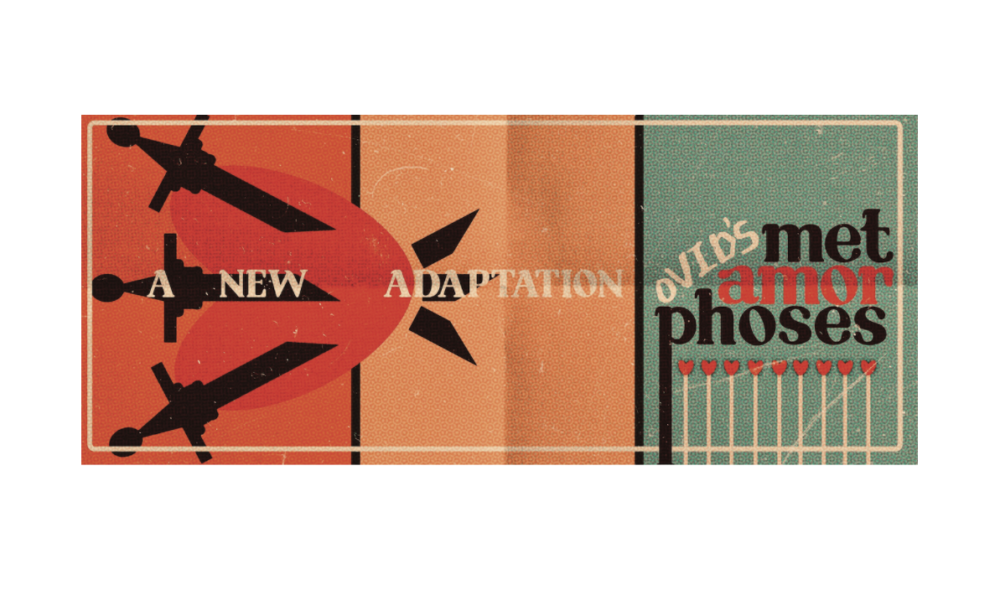For Ancient Romans, “following your heart” rarely resulted in finding true love—more often than not, it ended in untimely death, being transformed into a tree, or thousands of years of exile. According to Ovid’s Metamorphoses, the 2022 edition of the McGill Classics Play, love is to blame for the many divine mishaps recorded in Roman mythology. However, as the play unfolds, Metamorphoses reveals that love is a power that one should embrace, not reject.
Publius Ovidius Naso (43 BCE–17 CE), commonly known as Ovid, was one of the most famous writers from what is called the “Golden Age of Latin Literature.” While Ovid gained success from his love poems, he was also forced into exile in 8 CE for allegedly encouraging illicit love in his elegy Ars Amatoria—an exile that was only revoked in 2017, more than 2,000 years later. Fortunately, most of Ovid’s poetry survived, including his most well-known work: The narrative poem the Metamorphoses.
Although no less impressive in artistry, the McGill Classics Play, supported by a non-profit venture of the same name, is a tradition slightly younger than Ovid’s poetry. In 2011, Lynn Kozak, a McGill Classics professor, offered a simple challenge to ambitious Classics students: Translate original Greek or Roman texts and adapt them into original amateur theatre productions. Since then, the McGill Classics Play has staged a diverse array of impressive works, ranging from Sophocles’ Philoktetes to Euripides’ Hekabe. This year, Taryn Power, U3 Arts, and Keisuke Nakajima, BA ‘21, took on the roles of co-directors. After nearly a year of hard work, they successfully adapted Ovid’s poetry into a narrative that tackles questions about the nature of love.
“We did the translations ourselves,” Nakajima said in an email to The McGill Tribune. “A lot of the dialogues [and] monologues are taken from Ovid’s poems [….] On the other hand, there are a few scenes where we took more creative freedom.”
Some of these liberties included Orpheus’ (El Bush, U1 Arts) love of wearing Crocs in sport-mode, a Romeo-and-Juliet-inspired dialogue between star-crossed lovers Pyramus (Alexandra An) and Thisbe (Emma Weiser, U1 Arts), and the main narrative that ties the story together: Ovid’s (Gabrielle Gaston, U3 Arts) creative slump after his exile. Luckily for him, Amor (Fiona Vail, U2 Arts), a goddess of love, comes to joyfully persuade him to retell his favourite stories in hopes of rekindling his love for poetry—and possibly for the goddess Amor as well.
Ovid’s work often played with gender and sexuality—meaning that the play was ripe for interpretation. Nakajima and Power spent time carefully interpreting each line. For example, a skit starring Iphis (Sierra Burgoyne, U3 Science) describes a situation where Iphis, who is biologically female, presents themselves as a man to protect themselves from their father’s misogynistic beliefs.
“There was essentially two readings of the story in Ovid, and we ended up choosing one,” Power said. “One is that it’s a lesbian story, and then the other one is that it’s a story about gender non-conformity. We ended up going with the second one, just because honestly, I think it’s more ‘Ovid’ [….] It’s very much not like a physical metamorphosis. It’s all performative.”
The directors’ translations of the texts themselves were exercises in creativity and critical thinking. The play features several original funny folk tunes and wistful ballads created by Troy Lebane (U4 Music Education) and musician Taya Kendall, which further emphasize the themes of love and heartbreak in Ovid’s poems. The success of Ovid’s Metamorphoses only confirms the cast and crew’s resilience: They created a show from a dead language, brought characters to life, and produced a performance all within the chaos of a pandemic. The love that the directors have for the production goes to show that Ovid’s words on love—although from a different time and language—continue to bear weight today.
“It’s truly been a production where everyone’s been helping,” Power said. “Troy did the music, my best friend Taya did music and graphic design and everything else. Grace, [the set designer], has literally devoted her life to this play, and so I couldn’t ask for more support outside the cast and inside the cast.”









